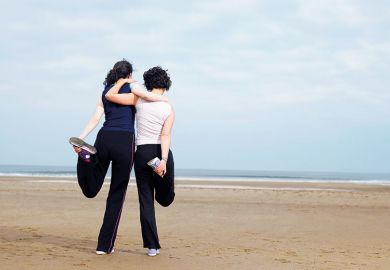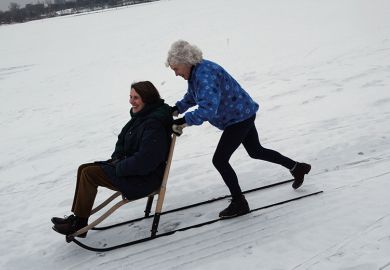I recently noticed that the issue of the menopause was completely absent from the Athena SWAN discussions within our faculty. When I pointed this out to the coordinator – a leading academic specialising in related theoretical issues – she admitted that it had not even crossed her mind that this might be something relevant to good gender practices. Evidently none of the other women on the committee, all in their thirties and forties, had thought about it either.
Perhaps this is not surprising. The best-selling feminist manifesto of the decade, Lean In: Women, Work, and the Will to Lead, by Facebook chief operating officer Sheryl Sandberg, which teaches women to be assertive about their specific needs at the workplace and with their partners, doesn’t mention the menopause once.
This silence about the menopause has very damaging effects on women. Many find themselves unprepared when menopause hits, in terms of physical and mental health. Hence the popularity of blogs such as the one by June Girvin, emeritus professor of nursing at Oxford Brookes University, eloquently titled “Everything I needed to know about the menopause…No One Told Me”. This describes the exasperating search for reliable strategies in a context of a “taboo” issue and an “information gap” and has elicited more than 50 comments from readers.
The menopause raises many issues around work, retirement and finances, some of them specifically relevant to universities. Here I want to draw on my own experiences to show how the academy often fails to support menopausal women in getting the help they require and so ends up pushing them to the sidelines.
I entered menopause in my early fifties. Nearly a decade later, I feel great – I am healthy and look good. That is because l spent a good deal of time educating myself to make informed decisions on managing the menopause (despite the limited amount of help and information available from the NHS) and chose to be assertive rather than ashamed.
I do not feel the need to be apologetic about “the change”. Every stage of life has its satisfactions and pleasures. As a senior academic, however, I cannot help noticing that my working life is now more difficult than it used to be. I can no longer work the 60-hour weeks that I have been putting in for more than 20 years, day in and day out. I need to convert some of this time into taking care of myself, to sleep enough and to exercise daily. Once this is done, I am perfectly fit to work – within the hours that my contract stipulates.
Unfortunately, academia now demands a commitment far beyond the contractual. It seems easier for the system to chew me up and spit me out rather than provide respect and support.
We might make a comparison with pregnancy and motherhood. In the past, working women were in essence on their own. Female academics who wanted children faced a significant struggle. Many opted out. This led to a public outcry, discussion and eventual consensus on what needed to be done. After years of battles, things changed. Today, there is a legislative framework to support women’s special needs relating to pregnancy and motherhood. Employers are liable if they do not comply.
Unlike having children, reaching menopause is not a matter of personal choice: all women get there if they live long enough. Yet there is next to nothing in place to help those with a chronically impaired hormonal balance and its associated conditions. Thus, between their early fifties (the average age for the onset of menopause in the UK is 51-52) and the time they are set to retire at 65, menopausal women are faced with difficulties similar to those faced by pregnant women and new mothers in the past. Finding a new job is out of the question for most of them, and there is no enforceable framework in place to accommodate any special needs.
Particularly in the cut-throat world of the academy, women who experience adverse symptoms of the menopause are not normally asked what support they need to continue working. (At my own place of work, administrators offer a workshop to teach women how to manage themselves, but not to teach those in managerial positions what menopausal women may need.) Instead, they are encouraged to switch to a part-time contract or to seek early retirement – with the strong implication that they are no longer “delivering”. That is certainly what happened to me.
Once I got to grips with the menopause, I sought accommodation at work. This was related to specific periods of absence that I would compensate for. It was not about reducing my duties but rather arranging my duties in a way that allowed me to stay healthy. My proposed arrangements were accepted, temporarily, but surrounded in silence. By the time I realised that the rationale for such accommodation was hushed up rather than communicated to colleagues, it was too late. Younger colleagues could see that special arrangements had been made for me, yet no one would openly say why. I found myself in the unenviable position of the elephant in the room. I imagine that the women who pioneered the struggle for pregnancy and maternity rights must have felt the same.
Then there was a change of management. Under my new boss – a younger man of great academic repute – bullying became the new normal. I would be omitted from planning for sabbaticals, for example – and had to complain to senior management to get back on the list. When I asked for a period of unpaid leave to treat menopause-related conditions, I received a suggestion (supposedly coming from senior management): why don’t you just change your contract and go part-time?
I currently enjoy an excellent academic reputation in the outside world and feel perfectly fine working full-time, as long as I can ensure that this is not damaging my health. At my place of work, however, I found myself treated like someone who is arrogant in her demands and standing in the way of the young. I am not keen to keep complaining, since the negative emotions that come up only do further damage. If I want to stay on, I have to shut up and be grateful for being tolerated.

So why would I want to continue working in a place where I am made to feel that I have overstayed my welcome? What about the option of early retirement? To answer that question, we need to look at the detail of the pension scheme for those working in British universities.
For academics, according to guidance from the Universities Superannuation Scheme, it is possible to retire as early as 55 (with various strings attached). This sounds like a scenario that is perfect for menopausal women who are perceived to be unable to “deliver”. However, it is not until the age of 63.5 that the full benefits one has accumulated can be accessed. If a woman opts to retire before then, this translates into a permanent reduction in the benefit. Universities that want to encourage them to leave early do not seem empowered by the USS to offer them a fair pension payout.
As a senior academic, I experience this quite clearly: why not leave and make way for younger academics? Because if I retire now, I will not only exchange a good salary for a small pension, I will also lose a significant part of my projected pension. This lose-lose scenario is the only one available.
I have devoted a good deal of effort to learning about these things. I hardly seem to be alone in this. In a recent conversation with other senior academic women, we observed that, since the age of 50, we have spent approximately the same amount of time reading about health, finances and employment legislation as about our specific academic subjects.
In a blog written for Wonkhe in 2019, “Time to talk about the menopause”, Lizzy Woodfield, a policy adviser at Aston University, explains why this is “a higher education issue”. Most obviously, this is because “universities employ thousands of menopausal women” (and also welcome many mature female students). Her hope is that “In an open and supportive working environment, it is more likely women will be able to secure the adjustments they need.” Yet she also cites a briefing by the University and College Union that notes that “the menopause is still not recognised as a workplace issue, which results in many women being unable to access the adjustments they need”.
It is only fair to acknowledge that things have begun to change in recent years and that the menopause is no longer considered just “a niche issue”. Yet emerging policies are severely limited by an approach that sees the menopause solely as a period of transition. There is recognition that symptoms vary widely, yet the menopause is still treated as “a bad patch”, an annoying hiccup that may require temporary support while it passes. In reality, women do not just bounce back from the transition. While the most active symptoms manifest over a two- or three-year period, the menopause leaves women with a chronic hormonal imbalance that often means significantly reduced energy, impaired sleep and low tolerance for stress, and sometimes the onset of other ailments and mental health difficulties.
If the menopause is a transition to old age, the transition beginning to be recognised by employers lasts only two or three years and so takes the woman to the age of 54-55, whereas the officially recognised “old age” for retirement and a full pension is set at 65 or 66. It is as if a woman was given support during pregnancy but no account was taken of the difficulties facing young mothers.
When I look back at my own academic career, I can see three moments when I needed support as a woman.
The first time was when I got pregnant. It was in the US, and my colleagues commented on how lucky I was that the birth would take place out of semester time, since I was not eligible for leave under the terms of my contract. I was also lucky to be in employment and so to receive medical assistance during pregnancy and birth. There was no maternity leave and I had to run home between classes to breastfeed.
Motherhood in the UK was somewhat better provided for (although pre-school childcare expenses were my biggest outlay and took up 50 per cent of my salary). Colleagues were supportive in allowing me to work from home as much as possible. When I asked for assistance, I received it.
The second time I needed support was when, a few years into my career as a full professor, I found out that a male colleague (or “comparator”, to use the legal jargon) was paid significantly more than me for doing the same job. This proved emotionally difficult, especially after it emerged that the situation was known about but not considered a priority that needed to be fixed. I took a deep breath and went to the top of the university to demand that my pay be brought in line with the pay of my male colleague.
This paid off and the anomaly was rectified. In retrospect, I discovered that I had done what few other women find the strength to do. The vice-chancellor herself commented on this. “Women don’t ask,” she said. This was the title of a 2004 book by Linda Babcock and Sara Laschever, subtitled “the high cost of avoiding negotiation – and positive strategies for change”, which she had read some years back and which had influenced her own approach to difficult situations. I had been one of the few women who asked, she added.
The third time I needed support came when I felt I needed some adjustments to my pattern of work to allow me to manage the menopause, stay healthy and continue working. As I have described, the arrival of a new manager meant that I started being treated like a freeloading member of staff – one whose demands were disproportionate and contributions insignificant. Assertiveness, openness and courage became irrelevant. This time around, I am on my own, and the fact that women often fail to ask is no longer relevant. One cannot ask for something in a context of illiteracy, where what I regard as reasonable and necessary is treated as extravagant and outlandish.
As things stand, the cost of menopause is borne by those who suffer it (unlike the cost of pregnancy, where substantial proportions are absorbed by society). The cost of maintaining ourselves in good health is borne by us. So, too, is the cost of taking early retirement. Since universities are knowledge organisations, one might hope for them to be more enlightened than other employers, but there seems little evidence of this. Both their particular pressures and pensions schemes may even add to the problem.
It is a simple fact that, through the menopause and beyond, a woman has special needs. For as long as this is not recognised, opportunities for shaming and bullying at the workplace are rife. In my own case, only two options are available: to accept the fact that I am treated like a parasite, hide away in shame and feel grateful for being tolerated – or to take the financial penalty of early retirement. I will soon settle on one of them.
The author, who teaches in the humanities faculty of a Russell Group university, wishes to remain anonymous.
POSTSCRIPT:
Print headline: Wise women, not pariahs
Register to continue
Why register?
- Registration is free and only takes a moment
- Once registered, you can read 3 articles a month
- Sign up for our newsletter
Subscribe
Or subscribe for unlimited access to:
- Unlimited access to news, views, insights & reviews
- Digital editions
- Digital access to THE’s university and college rankings analysis
Already registered or a current subscriber?






